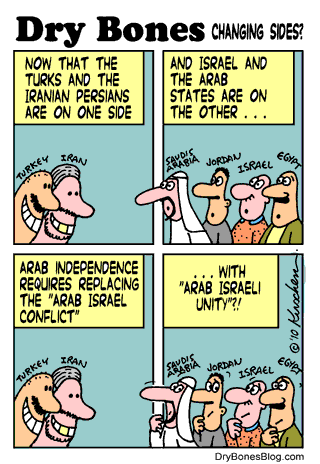Weekly column by Vic Rosenthal
The whole story of Israeli politics today is Binyamin Netanyahu.
I won’t bore you with countless scenarios, most of which are about as likely as the one in which I become Prime Minister. Everything is contained in six numbers:
Number of Knesset seats needed to form a government: 61.
Number committed to join a coalition with Netanyahu: 52 (Likud, Shas, UTJ, Religious Zionism).
Number opposed to Netanyahu: 57 (seven parties).
Uncommitted: 7 (Naftali Bennett’s Yamina party).
Committed to supporting Netanyahu from outside the coalition: 4 (Ra’am party of Mansour Abbas*).
Number considered “right-wing”: 72 (Likud, Shas, Yamina, UTJ, Religious Zionism, Tikvah Hadasha).
What this tells us is that if it were not for the contentiousness of Binyamin Netanyahu, there would be a natural right-wing government. It’s what the majority of Israelis want. Bibi’s Likud party received almost twice as many seats (30) as his nearest competitor, Yair Lapid’s Yesh Atid party (17). The Center, Left, and Arab parties (except Ra’am) amount to only 44. The right-wing-but-not-Bibi group has 20.
The ideological differences between this last group and Netanyahu are small to nonexistent. It’s personal to a great extent: Bennett, Avigdor Lieberman (Yisrael Beiteinu) and Gideon Sa’ar (Tikvah Hadasha) were all formerly members of the Likud who were squeezed out by Bibi, who does not tolerate even theoretical competition for leadership of the party. Lieberman and Bennett had cabinet positions in several previous coalitions in which they were prevented from exercising their supposed authority by a micro-managing Bibi.
Netanyahu is presently on trial on several charges of corruption, and if he is convicted he will have to step down as Prime Minister. A great deal of what has happened in Israeli politics in the past two years revolves around his opponents’ attempts to bring him down by means of these charges, and his struggle to stay in power – and out of jail. The charges are a mixed bag: the ones considered most serious by the prosecutors are called by some “invented crimes” that are merely politics as usual. On the other hand, it seems clear that he (and his wife – who is a big part of the problem) took expensive gifts from foreigners who had business with the government.
Bibi is so hated by the Left that there have been demonstrations with thousands of participants going on outside his homes and in other locations every Saturday night for at least a year. They accuse him of “destroying democracy and the rule of law” for his attempts to rein in the judiciary, including the Supreme Court and the state prosecutor’s office. But while, obviously, he is pursuing his personal interest, it is still true that the left-leaning legal establishment has arrogated to itself almost unlimited power and has destroyed the balance of powers between the legislature, the government, and the judiciary that is essential for a truly just regime.
There is no question that Bibi jealously hoards his power, and does not delegate it in areas that he considers important. He breaks promises repeatedly, both to his constituents and to other politicians. He has on occasion been responsible for ugly campaigns of innuendo against his opponents, such as a rumor that Naftali Bennett’s wife worked as a chef at a non-kosher restaurant (Bennett is an observant Jew as are many of his supporters), and that Benny Gantz (Blue and White) had an affair with another government minister.
And yet…
And yet, Bibi has been a great Prime Minister, arguably Israel’s greatest. His reign, the longest in the history of the state, has been remarkably peaceful. Some say he has only “kicked the can down the road,” but others argue that he has managed the covert war against Iran and its proxies very effectively, preventing Iran from going nuclear and interdicting the supply of improved weapons to Hezbollah in Lebanon and Syria. He has been criticized (unfairly, I think) for the poor relationship with former US President Obama (I blame Obama for this) but he presented Israel’s case to the US Congress forcefully, and galvanized opposition to the Iran deal, even if its opponents were ultimately outmaneuvered. On his watch the US finally moved its Embassy to Jerusalem, recognized Israel’s sovereignty in the Golan Heights, and exited the Iran deal. Bibi achieved improved relations with numerous countries, including the ground-breaking Abraham Accords with several Arab nations that were formerly counted among our enemies.
He has been criticized for the handling of the airport during the pandemic, as well as being too easy on the Haredim, who kept schools and yeshivot open and held massive weddings and funerals against government rules. But he did the one thing that was most important with respect to the Coronavirus: he brought us the vaccines that made Israel one of the most successful countries in the world in dealing with it. Yes, it is annoying that he constantly brags about it, and how it was a personal accomplishment, as if he himself vaccinated millions of Israelis. But as a matter of fact, it was – he truly did “obsessively” call the CEOs of the vaccine manufacturers. He did take the difficult decision to pay a premium price for the vaccine and provide data to the manufacturers. He did this. He had help of course, from the HMOs and the Health Ministry that set up the distribution system, but he is right in taking credit for it. Thanks to Bibi, today we are reopening our economy and returning to ordinary life, while Europeans are still struggling with lockdowns and shortages of vaccine.
I did not vote for him. Although his accomplishments are many, I am convinced that it’s time for new leadership. I voted for Bennett, whom I believe is smart enough and creative enough, as well as ideologically committed to strengthening Israel, including the Jewish communities in Judea, Samaria, and the Jordan valley, areas that are both the spiritual heartland of the nation as well as essential for its defense. And he has the moral qualifications, too. Is Bennett tough enough? Time will tell, although I think so.
But Bennett, whose party has a total of seven seats, is probably not going to be Prime Minister this time. I will go out on a limb and predict that Bibi will manage to snatch victory from the jaws of defeat once again, and Bennett and Sa’ar will join his coalition. He will either persuade the necessary two members of the Knesset from other parties to jump to his side, or he will convince the other members of his coalition to accept the support of the Ra’am party – an Arab Islamist party led by Mansour Abbas, who for pragmatic reasons will support Netanyahu and Likud.
If this happens, it will prove once again that in addition to being one of Israel’s greatest Prime Ministers, he is also an incredibly adroit politician. If he is also smart enough to understand that now is the time to step back and start thinking about retirement, that would also be good.
_____________________
* An Israeli Arab politician, not to be confused with the head of the Palestinian Authority, Mahmoud Abbas.

 Elder of Ziyon
Elder of Ziyon





































